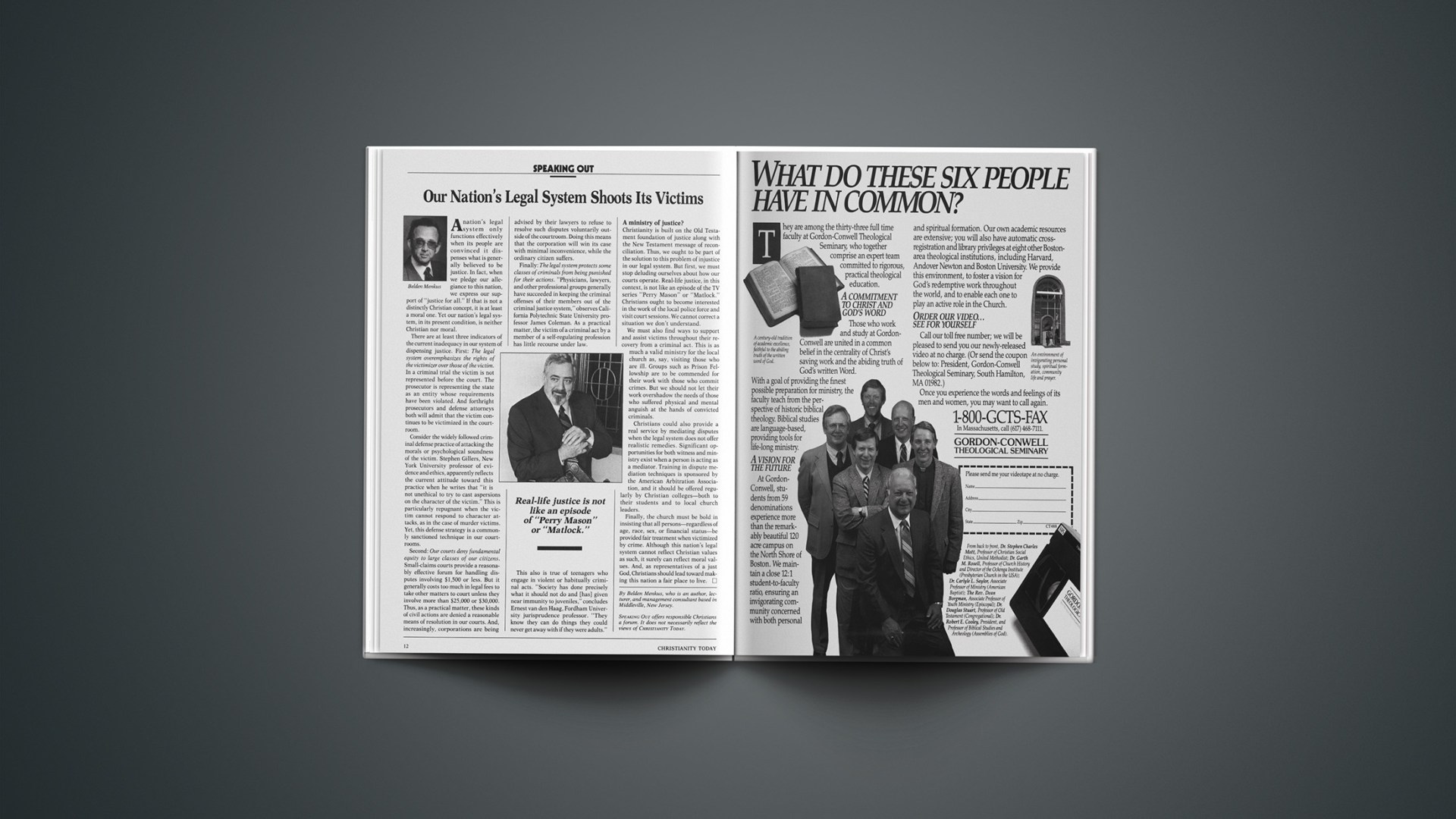A nation’s legal system only functions effectively when its people are convinced it dispenses what is generally believed to be justice. In fact, when we pledge our allegiance to this nation, we express our support of “justice for all.” If that is not a distinctly Christian concept, it is at least a moral one. Yet our nation’s legal system, in its present condition, is neither Christian nor moral.
There are at least three indicators of the current inadequacy in our system of dispensing justice. First: The legal system overemphasizes the rights of the victimizer over those of the victim. In a criminal trial the victim is not represented before the court. The prosecutor is representing the state as an entity whose requirements have been violated. And forthright prosecutors and defense attorneys both will admit that the victim continues to be victimized in the courtroom.
Consider the widely followed criminal defense practice of attacking the morals or psychological soundness of the victim. Stephen Gillers, New York University professor of evidence and ethics, apparently reflects the current attitude toward this practice when he writes that “it is not unethical to try to cast aspersions on the character of the victim.” This is particularly repugnant when the victim cannot respond to character attacks, as in the case of murder victims. Yet, this defense strategy is a commonly sanctioned technique in our courtrooms.
Second: Our courts deny fundamental equity to large classes of our citizens. Small-claims courts provide a reasonably effective forum for handling disputes involving $1,500 or less. But it generally costs too much in legal fees to take other matters to court unless they involve more than $25,000 or $30,000. Thus, as a practical matter, these kinds of civil actions are denied a reasonable means of resolution in our courts. And, increasingly, corporations are being advised by their lawyers to refuse to resolve such disputes voluntarily outside of the courtroom. Doing this means that the corporation will win its case with minimal inconvenience, while the ordinary citizen suffers.
Finally: The legal system protects some classes of criminals from being punished for their actions. “Physicians, lawyers, and other professional groups generally have succeeded in keeping the criminal offenses of their members out of the criminal justice system,” observes California Polytechnic State University professor James Coleman. As a practical matter, the victim of a criminal act by a member of a self-regulating profession has little recourse under law.
This also is true of teenagers who engage in violent or habitually criminal acts. “Society has done precisely what it should not do and [has] given near immunity to juveniles,” concludes Ernest van den Haag, Fordham University jurisprudence professor. “They know they can do things they could never get away with if they were adults.”
A ministry of justice?
Christianity is built on the Old Testament foundation of justice along with the New Testament message of reconciliation. Thus, we ought to be part of the solution to this problem of injustice in our legal system. But first, we must stop deluding ourselves about how our courts operate. Real-life justice, in this context, is not like an episode of the TV series “Perry Mason” or “Matlock.” Christians ought to become interested in the work of the local police force and visit court sessions. We cannot correct a situation we don’t understand.
We must also find ways to support and assist victims throughout their recovery from a criminal act. This is as much a valid ministry for the local church as, say, visiting those who are ill. Groups such as Prison Fellowship are to be commended for their work with those who commit crimes. But we should not let their work overshadow the needs of those who suffered physical and mental anguish at the hands of convicted criminals.
Christians could also provide a real service by mediating disputes when the legal system does not offer realistic remedies. Significant opportunities for both witness and ministry exist when a person is acting as a mediator. Training in dispute mediation techniques is sponsored by the American Arbitration Association, and it should be offered regularly by Christian colleges—both to their students and to local church leaders.
Finally, the church must be bold in insisting that all persons—regardless of age, race, sex, or financial status—be provided fair treatment when victimized by crime. Although this nation’s legal system cannot reflect Christian values as such, it surely can reflect moral values. And, as representatives of a just God, Christians should lead toward making this nation a fair place to live.
By Belden Menkus, who is an author, lecturer, and management consultant based in Middleville, New Jersey.
SPEAKING OUT offers responsible Christians a forum. It does not necessarily reflect the views of CHRISTIANITY TODAY.










